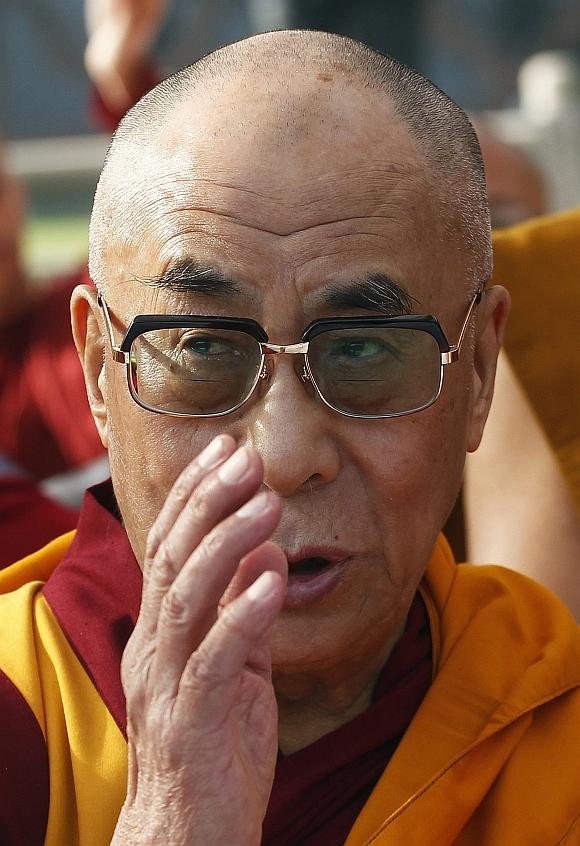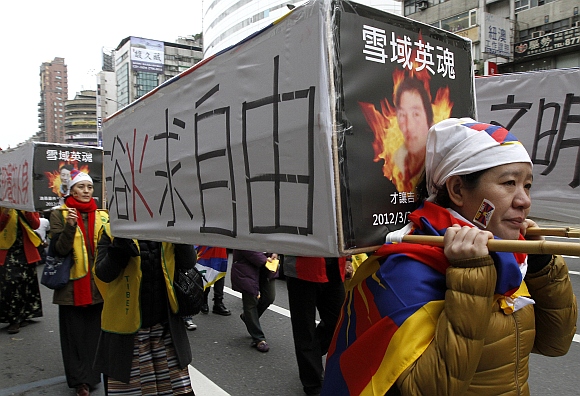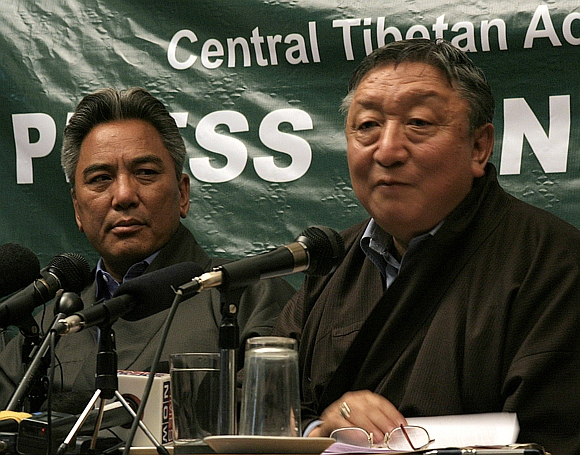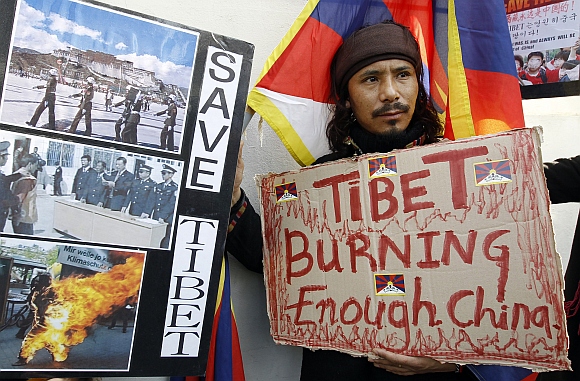 | « Back to article | Print this article |
Why Tibetans grow wary of Obama's ambivalence
Tibetans, both in the occupied Tibetan areas of China and in the diaspora, are increasingly frustrated by what they perceive as the ambivalent attitude of United States President Barack Obama on the continued unrest in the Tibetan areas of China, and the violations of the human rights of the Tibetans by Beijing, says B Raman
The Barack Obama administration, like its predecessor administrations, treats the Dalai Lama with due courtesies during his periodic visits to Washington DC. These courtesies include unofficial meetings.
The Obama administration has also been periodically voicing its unhappiness and concern over the continued violations of the human rights of the Tibetans by Beijing and urging it to resume the now-stalled talks with the representatives of the Dalai Lama.
But the Tibetans expected a greater activism by the US in view of the increasingly grim situation prevailing in the Tibetan areas since March 2011, following the protests of the monks of the Kirti monastery in Sichuan against the continued Han colonisation of the Tibetan areas.
Click NEXT to read further...
Why Tibetans grow wary of Obama's ambivalence
The monks have also been demanding the return of the Dalai Lama to Lhasa to take over the religious leadership of his people.
This grim situation has been marked by nearly 40 self-immolation attempts by both Tibetan men and women, detention without trial of defiant monks of the Kirti monastery in a military camp of Sichuan and forcibly subjecting many monks and others to what the Chinese call re-education.
During these re-education classes, they are forced to denounce the Dalai Lama and swear loyalty to the Chinese government and the Communist Party.
This grim situation, which initially started in Sichuan, subsequently spread to Qinghai and Gansi and is recently showing signs of spreading to Lhasa in the Tibet Autonomous Region bordering on India and Nepal.
Lhasa saw two self-immolation attempts on May 27 by monks who had come from outside the TAG.
Sources say that following the incidents in Lhasa, nearly about 3,000 members of the Chinese security forces have undertaken house-to-house enquiries to locate and arrest Tibetans who had come to Lhasa from outside the TAG and send them back to their provinces.
Click NEXT to read further...
Why Tibetans grow wary of Obama
About 600 local monks and others have reportedly been rounded up and shifted to a military camp of Lhasa for so-called re-education.
The details of the grim situation are well known to international human rights organisations, including the Human Rights Watch of the US. They have been highlighting these violations and demanding for over a year that international human rights observers should be allowed to visit the detention camp set up by Beijing in Sichuan, but the Chinese authorities have ignored these demands with contempt.
They have also been ignoring with contempt the periodic exhortations from Washington, DC to resume talks with the representatives of the Dalai Lama . The Chinese have repeatedly made it clear that any talks with his representatives will be on the personal future of the Dalai Lama and not on the future of the Tibetan areas under Chinese occupation.
They do not recognise the right of the Dalai Lama to negotiate on behalf of the Tibetan people.
In the face of this political deadlock and deteriorating human rights situation, Tibetan hopes that during her recent visit to Beijing, the US Secretary of State Hillary Clinton, would take up vigorously the grim human rights situation in the Tibetan areas were belied.
Click NEXT to read further...
Why Tibetans grow wary of Obama
It is this disappointment and frustration that are reflected in the decision on May 31, 2012, of two senior advisers of the Dalai Lama -- Lodi Gyari and Kelsang Gyaltsen -- to resign from leadership positions in the team constituted by the Dalai Lama to hold talks with the authorities of the Chinese Communist Party from time to time.
In an announcement, they "expressed their utter frustration over the lack of positive response from the Chinese side."
While they have attributed their resignations, which have been accepted by the Tibetan government-in-exile, to their frustration over the negative Chinese attitude, it is reliably understood that the hesitation of the Obama administration to vigorously take up with Beijing the grim human rights situation has also contributed to their frustration, but they have not mentioned so in public.
The Dalai Lama, who is no longer involved in the day-to-day running of the government-in-exile, has not so far commented on the resignations, but it is unlikely that the two would have taken the decision without informally consulting the Dalai Lama beforehand.
Beijing is unlikely to be moved by their resignations. It is to be seen what impact it has on the Obama administration.
A statement issued by the government-in-exile after accepting their resignations urged Beijing to accept the Dalai Lama's "middle-way" approach, which seeks genuine autonomy for Tibetans within China and within the framework of the Chinese constitution.
Click NEXT to read further...
Why Tibetans grow wary of Obama's ambivalence
It said, "This is a win-win proposition, which contributes to PRC's unity, stability, harmony and its peaceful rise in the world."
The Tibetan task force on the negotiations with Beijing will be expanded and will meet again in December to discuss the Chinese leadership transition with the hope of continuing a dialogue with the new Chinese leaders to peacefully resolve the issue of Tibet, the statement said.
The Tibetans see no likelihood of any forward movement in addressing the grievances of the Tibetans in view of the forthcoming leadership transition in Beijing and the US presidential elections.
The government-in-exile has, therefore, decided to wait till the end of the year. What impact this will have on the grim ground situation in the Tibetan areas remains to be seen.
TOP photo features of the week
Click on MORE to see another set of PHOTO features...





